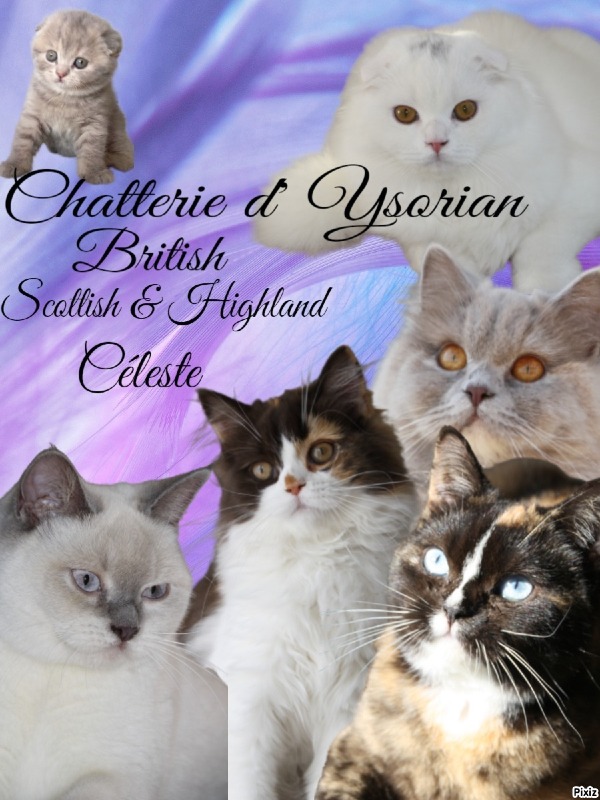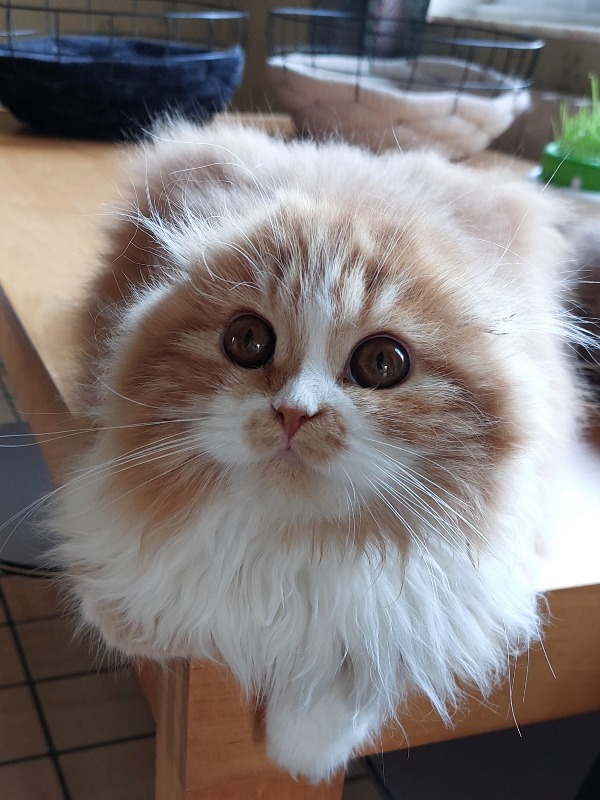Scottish fold
Welcome to our page dedicated to the breed of cat scottish fold!
Here, you will find all the useful information about scottish fold. This descriptive profile will allow you to discover the aspects of this breed. You can notably consult information about the average price, monthly and annual upkeep expenses, their health, name ideas, as well as their official recognition by competent authorities.
Explore this page to discover everything you need to know.
Overall description of the breed
The Scottish Fold is a cat breed characterized by its ears folded forward and downward, creating a unique and adorable appearance. Its history is marked by a serendipitous discovery and the hard work of passionate breeders to preserve this distinctive feature.
The history of the Scottish Fold begins in the 1960s in Scotland. It was there that a shepherd named William Ross noticed a white kitten with folded ears on a neighbor's farm. Intrigued by this peculiarity, he took in the kitten and started a new lineage. He named the cat Susie, and her offspring all shared this trait of folded ears.
It's important to note that the folded ears of the Scottish Fold are the result of a natural genetic mutation. However, this specific genetic characteristic can sometimes cause health issues, particularly joint and bone problems. This led to ethical and animal welfare concerns that impacted the breeding and recognition of the breed.
To avoid health problems, breeders often practice selective crossbreeding between Scottish Folds and other cat breeds like British Shorthairs, to ensure sufficient genetic diversity while preserving the characteristic ear fold.
The morphology of the Scottish Fold is quite distinctive. Besides their folded ears, they have a medium to large, muscular, and compact body. Their coat can be short or semi-long and comes in a variety of colors and patterns. Accepted colors range from white to black, including red, cream, blue, silver, and many others.
As for temperament, the Scottish Fold is often described as gentle, affectionate, and playful. They are known to be loyal companions that form close bonds with their owners. They are usually friendly towards children, other pets, and strangers, making them suitable pet cats for different households.
In terms of weight and size, the Scottish Fold has an average weight of about 3.5 to 7 kg (8 to 15 lb). They typically measure between 20 and 30 cm (8 to 12 inches) at the shoulder.
In 1966, the Scottish Fold breed was officially recognized by the Gouverning Council of the Cat Fancy (GCCF) in the United Kingdom. However, due to concerns regarding health issues related to the genetic mutation, some organizations like the Cat Fanciers’ Association (CFA) in 1978, or The International Cat Association (TICA) a few years later, introduced strict rules for breeders to ensure the health and well-being of cats of this breed.
Despite ethical and health concerns, the Scottish Fold continues to enjoy considerable popularity as a loving and charming pet breed. Although their history has been punctuated by challenges, their distinctive appearance and endearing personality make them sought-after companions in many households worldwide.
Awareness of acquiring an animal
Each animal is a sensitive being, deserving love, attention and care.
When you choose to adopt an animal, you take on the responsibility of ensuring its health and well-being throughout its life.
To learn more about animal welfare, we invite you to consult our FAQ by clicking the button below:
Origins
The Scottish Fold cat breed originates from Scotland, where it was first discovered in the 1960s. The first cat of this breed, named Susie, was found by a Scottish shepherd named William Ross. Susie had a unique feature: her ears were folded forward, a genetic trait caused by a natural mutation. Susie was crossed with British shorthair cats, which allowed this characteristic to be perpetuated and gave rise to the breed known today as the Scottish Fold. This genetic mutation is autosomal dominant, which means that only one parent needs to have the mutation for it to be passed on to their offspring. This breed quickly gained popularity for its distinct appearance and affectionate nature.
History
The Scottish Fold cat breed was officially recognized in 1966. However, the beginnings were marked by concerns about the health of these cats due to the genetic mutation responsible for their folded ears. Despite these initial concerns, the breed continued to develop, mainly thanks to the efforts of passionate breeders. In the United States, the breed was recognized by the Cat Fanciers' Association (CFA) in 1978, which further promoted the Scottish Fold in North America. Today, the Scottish Fold is recognized by many feline associations around the world and is appreciated for its unique appearance and gentle temperament.
Standard
The breed standard for the Scottish Fold emphasizes several distinctive characteristics. The ears must be folded forward and downward, giving the head a round and soft appearance. The eyes are large, round, and expressive, adding to the gentle expression of the face. The body is medium-sized, well-muscled, and balanced, with legs of medium length and a tail proportionate to the rest of the body. The coat can be short or long, depending on the variety, and must be dense and well furnished. Accepted coat colors and patterns are varied, including all possible colors and patterns. The Scottish Fold should display an affectionate and calm temperament, with a friendly behavior towards humans and other animals.
Physical characteristics
The Scottish Fold is a medium-sized cat. Males usually weigh between 4 and 6 kg, while females weigh between 2.7 and 4 kg. The coat can be short or long, depending on the variety, and must be dense and well furnished. Accepted coat colors are varied, including all possible colors and patterns such as white, black, blue, cream, red, bi-color, and tabby. Eyes are large and round, often matching the color of the coat. The most distinctive feature of the Scottish Fold is, of course, its ears folded forward, although some individuals may be born with straight ears (Scottish Straight).
Character
The Scottish Fold is known for its gentle, calm and affectionate temperament. They are very sociable cats who enjoy the company of humans and other animals. They are generally easygoing and adapt well to different environments, whether in an apartment or a house. Scottish Folds enjoy playing, but they are not as active as some other breeds. They often prefer moments of tranquility and cuddles with their owners. Their curious and intelligent nature makes them interesting and engaging companions. They are also known for their ability to sit in adorable positions, such as sitting on their hind legs, which adds to their charm.
Life expectancy
The life expectancy of a Scottish Fold is generally between 12 and 15 years, although some may live longer with proper care. Like all cat breeds, longevity depends on several factors, including genetics, diet, veterinary care, and environment. A balanced diet, regular visits to the veterinarian, and a healthy lifestyle can help extend the life of a Scottish Fold. It is important to closely monitor their health, especially due to some potential genetic problems related to their folded ears, such as osteochondrodysplasia, a condition that affects bone and cartilage development.
Exercise and activity needs
Scottish Folds are moderately active cats who enjoy interactive games but do not require intense exercise. They like playing with toys, climbing on cat trees, and interacting with their owners. Daily play sessions are recommended to keep them mentally and physically stimulated. Hunt-like games, such as feather toys and balls, can be particularly appealing to them. Although they are quieter than some other breeds, they still benefit from regular activities to prevent boredom and overweight. Providing an enriching environment with perches, hiding spots, and scratching posts can contribute to their overall well-being.
Recommended diet
To maintain a Scottish Fold in good health, a balanced and high-quality diet is essential. It is recommended to provide them with a combination of dry kibble and wet food for optimal nutrition. The nutritional needs vary depending on the age, weight, and activity level of the cat. In general, the monthly cost of feeding a Scottish Fold ranges from 30 to 50 euros. It is important to choose foods specifically formulated for cats, with ingredients rich in animal proteins. Dietary supplements, such as omega-3 and omega-6 fatty acids, can also be beneficial for the health of their coat and joints.
Training and obedience
The education and training of a Scottish Fold can be relatively easy thanks to their intelligent nature and their desire to please their owners. They respond well to positive reinforcement techniques, such as rewards in the form of treats and praise. Starting training at a young age is crucial to establish good habits. Scottish Folds can learn basic commands like "sit" and "come", as well as desirable behaviors like using the litter box and scratching on appropriate surfaces. Training sessions should be short and frequent to maintain their interest and avoid frustration.
Behavior with children
The Scottish Fold is generally an excellent companion for children due to its gentle and affectionate temperament. These cats are known to be patient and tolerant, making them well suited for a home with children. They enjoy playing and can easily adapt to the energy of children while remaining calm and composed. However, it is important to supervise interactions between young children and cats to ensure that the cat's boundaries are respected. Teaching children how to handle and play properly with a cat is essential for establishing a harmonious and safe relationship.
Compatibility with Other Animals
Scottish Folds are generally compatible with other pets, including dogs and other cats. Their gentle and sociable nature allows them to easily adapt to the presence of other animals in the house. Introductions should be done gradually and under supervision to ensure a smooth transition. It is recommended to provide separate spaces for each animal at first, so they can adjust to each other at their own pace. With time and proper introduction, Scottish Folds can form close bonds with their animal companions and live harmoniously.
Grooming needs
The grooming of a Scottish Fold varies depending on the length of its fur. Short-haired Scottish Folds require weekly brushing to remove dead hair and reduce the formation of hairballs. Long-haired Scottish Folds, on the other hand, require more frequent brushing, ideally several times a week, to avoid knots and tangles. In addition to brushing, it is important to regularly check the ears of these cats due to their folded shape, which can promote the accumulation of earwax and infections. Claw, teeth, and eye care should also be part of the grooming routine.
Health
Scottish Folds can be subject to certain health conditions due to the genetic mutation responsible for their folded ears. Osteochondrodysplasia, which affects the development of bones and cartilage, is a major concern. Owners should be vigilant for signs of joint pain or stiffness and consult a vet regularly. Other common health issues include ear infections, cardiomyopathies, and kidney diseases. A balanced diet, regular veterinary care, and special attention to their comfort can help prevent or manage these problems. It is also advisable to choose responsible breeders who test their animals for these genetic conditions.
Average price
The average price of a Scottish Fold varies depending on several factors such as lineage, coat color, and breeder. Generally, a Scottish Fold can cost between 800 and 2000 euros. Scottish Folds with show characteristics or prestigious pedigrees can reach higher prices. It is crucial to buy cats from reputable breeders who conduct health tests and provide a health guarantee for their animals. Initial costs may also include expenses for spaying/neutering, vaccinations, and first veterinary exams.
Expenses
Monthly expenses for a Scottish Fold can vary, but generally range between 50 and 100 euros. This includes the cost of food, regular veterinary care, grooming products, and toys or accessories. Annual veterinary visits for vaccines and health check-ups are essential to maintain your cat's health. Other potential costs may include parasite treatments, dental care, and pet insurance. Proper budget planning is important to ensure the ongoing well-being of your Scottish Fold.
Name ideas
Choosing a name for your Scottish Fold can be fun and reflect their unique personality. Here are some suggestions: Luna, Milo, Bella, Simba, Daisy, Oliver, Nala, Max, Charlie, Lily, Leo, Chloe, Jack, Sophie, Jasper, Felix, Oscar, Ruby, Sam, and Mia. These names can suit different temperaments and appearances, offering a variety of choices to find the perfect name for your new companion. Remember that the name you choose should be easy to pronounce and recognize for your cat.
Legislation and regulation
In France, as in many other countries, there is no specific legislation concerning Scottish Folds as a breed. However, it is mandatory to comply with general laws on animal protection, which include requirements on vaccination, sterilization, and basic care. Breeders must be registered and comply with ethical and sanitary standards. In some countries, health concerns related to the genetic characteristics of Scottish Folds have led to specific regulations on their breeding. It is advisable to check local and national laws in force to ensure compliance.
Official recognition
Scottish Folds are recognized by many international feline organizations. The Cat Fanciers' Association (CFA) in the United States, the Fédération Internationale Féline (FIFé) in Europe, and the Governing Council of the Cat Fancy (GCCF) in the United Kingdom are among the organizations that officially recognize this breed. These organizations establish breed standards and promote responsible breeding practices. Official recognition facilitates participation in feline shows and helps preserve breed standards.
Pedigrees
Several breed clubs and associations offer pedigrees for Scottish Folds. In France, the LOOF (Livre Officiel des Origines Félines) is the official organization that provides pedigrees. In the United States, the Cat Fanciers' Association (CFA) and The International Cat Association (TICA) also offer pedigrees for this breed. In Europe, the Fédération Internationale Féline (FIFé) is another important organization. These breed clubs track lineages and encourage ethical breeding practices to preserve the health and characteristics of the breed.
Destination and usage
Scottish Folds are primarily bred as pets because of their gentle and affectionate temperament.
Prohibitions
There are generally no specific bans on owning Scottish Folds in most countries. However, due to health concerns related to the genetic mutation responsible for their folded ears, some countries or regions may have restrictions or specific recommendations regarding their breeding. It is important to research local regulations and choose responsible breeders who test their cats for potentially problematic genetic conditions. Ethical breeding practices are essential to ensure the well-being of Scottish Folds and minimize health risks.
Breeders of Scottish fold
Want to see more breeders of Scottish fold?
Check out the page of our directory listing all breeders of Scottish foldClassified Ads of scottish fold
No of scottish fold classified ads are available on Preeders.
If you’re a breeder, sign up for free now and be the first to post a classified ad
Breed clubs of scottish fold
No of scottish fold breed clubs are currently registered on Preeders.
If you would like to highlight your breed club, sign up for free now and be the first to appear on this page.






